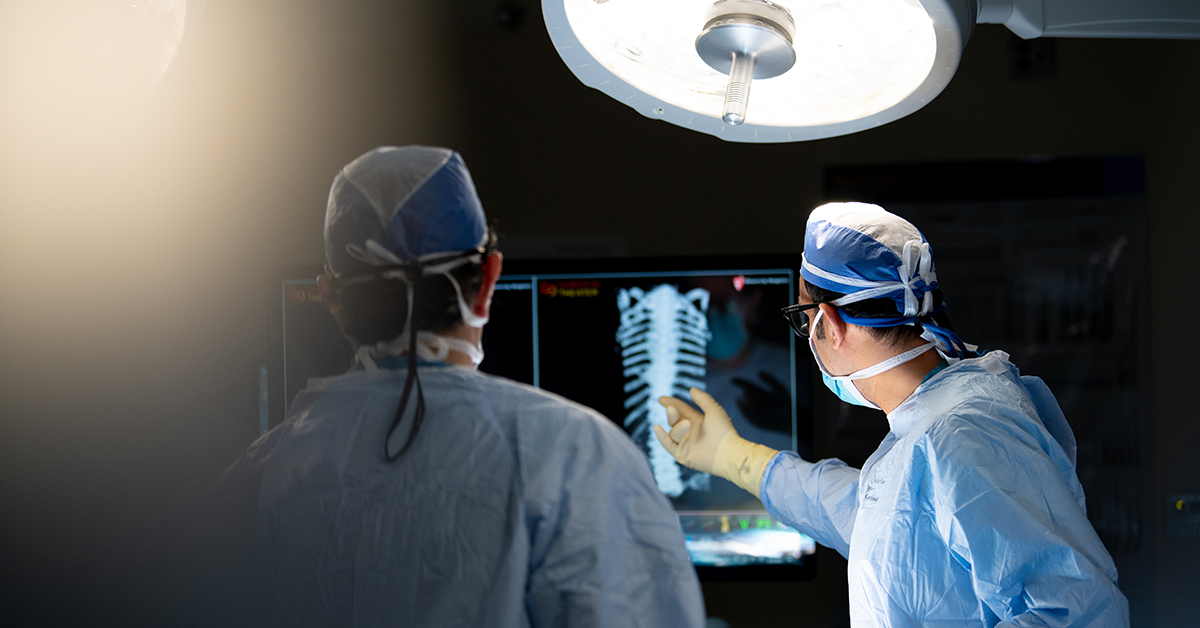Hackensack University Medical Center Participates in Elezanumab Trial for Spinal Cord Injury
International trial evaluating immunotherapy drug studied for impact on outcomes in cervical spine injuries

Hackensack University Medical Center is participating in an international, multicenter clinical trial to test the immunotherapy drug elezanumab to see whether it can safely improve outcomes in patients who have experienced an acute traumatic cervical spinal cord injury.
“In some cases, with surgery and intensive rehabilitation, patients may get some level of function back, but there is no medication that can reliably reverse injury,” said Mohammed F. Khan, M.D., FAANS, assistant professor of Neurosurgery, Hackensack Meridian School of Medicine, one of the nation’s leading neurosurgeons specializing in complex injuries and disorders of the spine. “With our current trial, we are looking at a possible way to reverse the damage caused by spinal cord injury, as well as the potential to improve outcomes.”
Half of the patients in the trial will receive the monoclonal antibody medication elezanumab intravenously, and the other half will receive placebo. To be eligible for the study, patients must have a qualifying injury and receive the infusion within 24 hours of injury and every four weeks through Week 48 for 13 doses.
“The medication is a monoclonal antibody directed against RGM (repulsive guidance molecule). It is designed to facilitate the mechanism the central nervous uses to repair damage after a spinal cord injury to the axons, the nerve fibers that relay information from the brain through the spinal cord,” said Florian Thomas, M.D., Ph.D., chair, Neuroscience Institute and Department of Neurology at Hackensack University Medical Center and founding chair and professor of Neurology at Hackensack Meridian School of Medicine. “The drug is currently being tested in a separate clinical trial for stroke, and that trial is also available at Hackensack University Medical Center.”
After a patient with a spinal cord injury is diagnosed and stabilized in the Emergency Department, they often require emergency surgery to decompress the spinal cord. When they are moved to the Neuro-ICU, neurocritical care experts will evaluate patients to determine if they are candidates for the clinical trial.
At the Hackensack Meridian Neuroscience Institute at Hackensack University Medical Center, patients who sustain a traumatic spinal cord injury have access to a Level I trauma center staffed by a comprehensive team of experts, including Dr. Khan and three neurointensivists, led by Kaitlin J. Reilly-Kit, M.D., assistant professor of Neurology at the Hackensack Meridian School of Medicine.
Patients receive neurosurgical and neurocritical intensive care at the Helena Theurer Pavilion—a new, nine-story, 530,000-square-foot surgical/intensive care tower on the Hackensack University Medical Center campus. The Pavilion is the first hospital in New Jersey to acquire an intraoperative MRI system, and patients in the Intensive Care Unit (ICU) have access to a dedicated CT scanner, enhancing critical care efficiency and safety while eliminating the need to move patients from one area of the hospital.
“In this setting of high-level care, we can give patients the best chance of a good outcome,” said Dr. Khan.
Learn more about neurological innovations happening at Hackensack University Medical Center.
